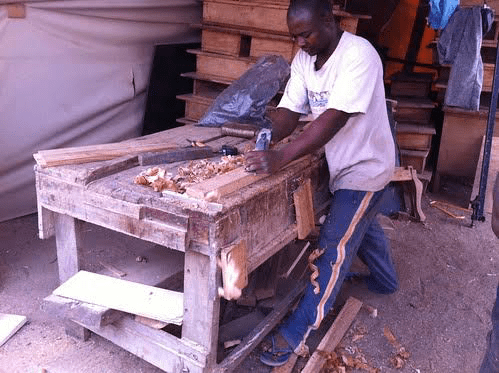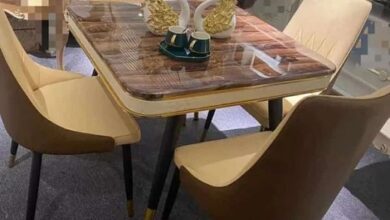
15 Best Handwork In Nigeria
Nigeria, with its rich cultural heritage and diverse ethnic groups, is a treasure trove of traditional handwork. These crafts passed down through generations, showcase the artistic prowess and ingenuity of the Nigerian people. From pottery to weaving and intricate beadwork, this article explores the top 15 best handworks in Nigeria that continue to captivate both locals and tourists alike.InformationGuideNigeria
Read Also: 5 Steps To Start a T-Shirt Business in Nigeria
👉 Relocate to Canada Today!
Live, Study and Work in Canada. No Payment is Required! Hurry Now click here to Apply >> Immigrate to CanadaTop 15 Best Handwork In Nigeria
-
Pottery
Pottery is an ancient craft that thrives in various parts of Nigeria. Skilled artisans create beautiful clay pots, vases, and other household items using traditional techniques. Pottery from the Igbo, Yoruba, and Hausa tribes is particularly renowned for its intricate designs and exquisite craftsmanship.NYSC Portal
2. Adire Fabric
Originating from the Yoruba people in southwestern Nigeria, Adire fabric is a resist-dyed textile known for its vibrant patterns. Artisans use a variety of techniques, such as tie-dye and hand-painting, to create unique designs on cotton or silk fabrics.
3. Aso Oke Weaving
Aso Oke is a handwoven fabric traditionally worn by the Yoruba people on special occasions. Skilled weavers create intricate patterns using colorful silk or cotton threads. The fabric is often used to make traditional clothing such as agbada and gele (head-ties).15 Best Handwork In Nigeria
4. Beadwork
Beadwork holds a significant cultural and spiritual value in Nigeria. Artisans skillfully handcraft intricate bead designs, often using them for jewelry, ceremonial costumes, and home décor items. The Yoruba and Igbo tribes are particularly renowned for their beadwork traditions.
Read Also: 7 Problems Facing Local Craft Industries In Nigeria
5. Leatherworks
Nigeria’s leather industry produces a wide range of exquisite handcrafted products. Skilled artisans create leather bags, shoes, belts, and accessories using traditional techniques. Cities like Kano and Lagos are known for their high-quality leather goods.
6. Woodcarving
Woodcarving is a traditional craft found throughout Nigeria. Talented artisans carve intricate designs on various types of wood, creating masks, sculptures, furniture, and musical instruments. The Igbo, Yoruba, and Edo tribes are famous for their woodcarving skills.15 World Best Banks in Nigeria
7. Brass and Bronze Casting
Nigeria’s ancient bronze casting tradition dates back to the Benin Kingdom. Artisans create stunning sculptures and intricate royal regalia using the lost-wax casting technique. The exceptional craftsmanship of these pieces showcases the artistic prowess of the Nigerian people.JAMB Portal
👉 Relocate to Canada Today!
Live, Study and Work in Canada. No Payment is Required! Hurry Now click here to Apply >> Immigrate to Canada8. Textile Printing
Textile printing is a popular handwork in Nigeria, with the most famous being the indigo-dyed fabric known as “Adire.” Artisans use various printing techniques, such as block printing and stencil dyeing, to create unique patterns on fabric.200 Romantic Love Message
9. Basket Weaving
Basket weaving is a traditional craft practiced by many Nigerian tribes. Artisans skillfully weave baskets using locally sourced materials such as palm fronds and raffia. These baskets serve both functional and decorative purposes and are often adorned with colorful patterns.
Read Also: 15 Best Bank for POS business in Nigeria
10. Embroidery
Embroidery is a delicate handwork that is prevalent across Nigeria. Skilled artisans create intricate designs on fabrics, including traditional clothing, accessories, and home textiles. The art of embroidery is passed down through generations, preserving the cultural heritage of various Nigerian tribes.
11. Adorned Calabash
Calabash gourds are transformed into stunning works of art through the traditional craft of adornment. Artisans carve intricate patterns on the surface of the calabash and then apply dyes and embellishments to create unique decorative pieces and functional containers.105 Good Morning Love Messages
12. Tie and Dye
Tie and dye, also known as “Kampala” or Adire Eleko,” is a popular handwork in Nigeria. Artisans use techniques like folding, twisting, and tying fabric before dyeing it to create unique patterns.
The vibrant and colorful fabrics produced through tie and dye are widely used for clothing, home furnishings, and accessories.How to Make Hair Growth Cream in Nigeria
13. Mat Weaving
Mat weaving is a traditional craft that produces functional and decorative mats using locally available materials such as raffia, grass, and palm fronds. These mats are used for sitting, sleeping, and as floor coverings. Skilled weavers incorporate intricate designs and patterns, showcasing the creativity and craftsmanship of Nigerian artisans.
Read Also: 10 Social Factors Affecting Business In Nigeria
14. Pottery Painting
In addition to creating beautiful clay pottery, Nigerian artisans also excel in pottery painting. Intricate patterns and motifs are painted onto ceramic vessels using natural pigments and dyes. These painted pots serve both aesthetic and utilitarian purposes, reflecting the cultural traditions of different Nigerian communities.
15. Adornment Crafts
Nigerian artisans are known for their expertise in creating stunning adornment crafts. These crafts include intricately designed traditional crowns, headpieces, jewelry, and body adornments made from a variety of materials such as beads, shells, feathers, and metals. These adornments are worn during ceremonial events, festivals, and cultural celebrations, adding a touch of elegance and cultural significance.
Read Also: 10 Importance of Small Scale Business in Nigeria
Conclusion
The top 15 handworks in Nigeria showcased in this article represent the country’s rich cultural heritage and artistic traditions. These crafts are not only a testament to the creativity and skill of Nigerian artisans but also serve as important cultural symbols and expressions. From pottery to weaving, beadwork to brass casting, each handwork tells a unique story and carries the essence of Nigerian identity. As these crafts continue to be practiced and celebrated, they contribute to the preservation of Nigeria’s diverse cultural heritage and serve as a source of inspiration for future generations of artisans.
Check JAMB Result
Check and Confirm: How much is Dollar to Naira







